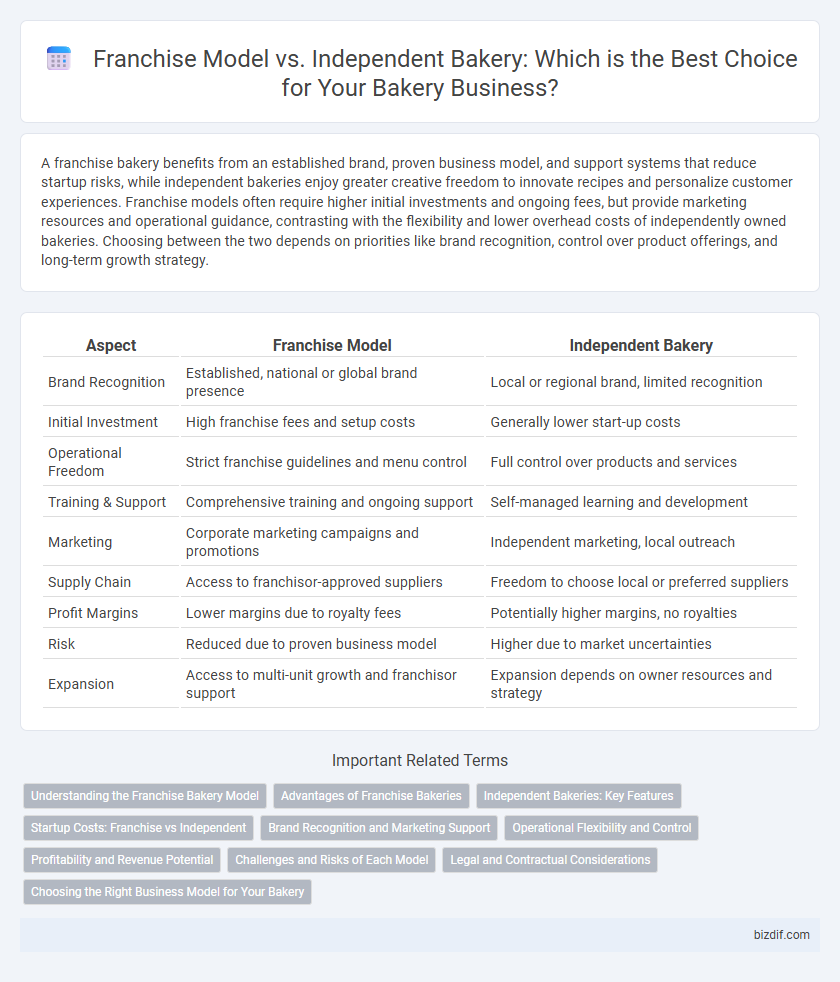A franchise bakery benefits from an established brand, proven business model, and support systems that reduce startup risks, while independent bakeries enjoy greater creative freedom to innovate recipes and personalize customer experiences. Franchise models often require higher initial investments and ongoing fees, but provide marketing resources and operational guidance, contrasting with the flexibility and lower overhead costs of independently owned bakeries. Choosing between the two depends on priorities like brand recognition, control over product offerings, and long-term growth strategy.
Table of Comparison
| Aspect | Franchise Model | Independent Bakery |
|---|---|---|
| Brand Recognition | Established, national or global brand presence | Local or regional brand, limited recognition |
| Initial Investment | High franchise fees and setup costs | Generally lower start-up costs |
| Operational Freedom | Strict franchise guidelines and menu control | Full control over products and services |
| Training & Support | Comprehensive training and ongoing support | Self-managed learning and development |
| Marketing | Corporate marketing campaigns and promotions | Independent marketing, local outreach |
| Supply Chain | Access to franchisor-approved suppliers | Freedom to choose local or preferred suppliers |
| Profit Margins | Lower margins due to royalty fees | Potentially higher margins, no royalties |
| Risk | Reduced due to proven business model | Higher due to market uncertainties |
| Expansion | Access to multi-unit growth and franchisor support | Expansion depends on owner resources and strategy |
Understanding the Franchise Bakery Model
The franchise bakery model offers standardized recipes, brand recognition, and established customer loyalty, enabling quicker market entry and consistent product quality. Franchisees benefit from corporate support in marketing, training, and supply chain management, reducing operational risks compared to independent bakeries. This model contrasts with independent bakeries, which enjoy creative freedom but face challenges in brand building and scaling operations without the backing of a larger network.
Advantages of Franchise Bakeries
Franchise bakeries benefit from established brand recognition, which drives higher customer trust and foot traffic compared to independent bakeries. They gain access to proven business models, comprehensive training, and ongoing support, reducing operational risks and accelerating growth potential. Bulk purchasing power in franchises also lowers ingredient and equipment costs, enhancing profitability and competitive pricing.
Independent Bakeries: Key Features
Independent bakeries emphasize artisanal quality, personalized customer service, and unique, locally inspired product offerings that differentiate them from franchise models. They leverage creative freedom to experiment with recipes and innovate, often sourcing ingredients from local suppliers to enhance freshness and community ties. Financially, independent bakeries typically have lower startup costs but face higher operational risks without the support systems and brand recognition that franchises provide.
Startup Costs: Franchise vs Independent
Startup costs for a bakery franchise typically range from $200,000 to $500,000, covering franchise fees, equipment, and initial inventory, while independent bakeries often have lower startup costs averaging between $50,000 and $150,000, primarily for equipment and rent. Franchise models benefit from established brand recognition and support systems but require ongoing royalty fees amounting to 5-10% of gross sales. Independent bakeries face higher marketing challenges but retain full control over finances and operational decisions without recurring franchise costs.
Brand Recognition and Marketing Support
Franchise bakeries benefit from strong brand recognition and centralized marketing support that drives customer loyalty and consistent foot traffic. Independent bakeries rely heavily on local reputation-building and personalized marketing efforts, which can limit outreach but offer unique brand identity. The franchise model leverages national advertising campaigns and established digital platforms, providing a competitive edge over standalone bakeries in attracting broader audiences.
Operational Flexibility and Control
Franchise bakeries offer standardized recipes, proven business models, and centralized support, which streamline operations but limit operational flexibility and creative control. Independent bakeries have full autonomy over their products, pricing, and marketing strategies, enabling quick adaptation to market trends and customer preferences. Operational control in independent bakeries often leads to unique brand positioning, but requires more hands-on management and carries higher risk compared to franchise systems.
Profitability and Revenue Potential
Franchise bakeries often benefit from established brand recognition and proven business models, leading to higher and more predictable revenue streams compared to independent bakeries. Independent bakeries have greater control over product innovation and pricing, which can result in higher profit margins but come with increased operational risks and market uncertainties. Analyzing local market demand, startup costs, and ongoing fees is essential to determine the most profitable and sustainable business model in the bakery industry.
Challenges and Risks of Each Model
Franchise bakery models offer established brand recognition and support systems but face challenges like high initial fees, strict operational guidelines, and limited creative control, increasing the risk of financial loss if the brand underperforms. Independent bakeries confront risks including building brand awareness from scratch, managing all aspects of operations solo, and bearing full responsibility for marketing, supply chain, and quality control, which can strain resources and hinder scalability. Both models require careful evaluation of market conditions, customer preferences, and financial capacity to mitigate risks and ensure sustainable growth.
Legal and Contractual Considerations
Franchise bakery models require adherence to comprehensive legal agreements, including franchising contracts that define brand use, operational standards, and royalty payments. Independent bakeries benefit from greater autonomy but must navigate licensing, health regulations, and local business permits without the support structure provided by a franchisor. Understanding intellectual property rights and liability clauses is crucial in franchise agreements to avoid legal disputes and protect both the franchisor's brand and the franchisee's investment.
Choosing the Right Business Model for Your Bakery
Selecting the right business model for your bakery depends on factors such as brand recognition, control over recipes, and startup costs. Franchise bakeries offer established branding and marketing support, making it easier to attract customers quickly, while independent bakeries allow complete creative freedom and menu customization. Analyzing local market demand, financial goals, and long-term growth potential helps determine whether a franchise or independent model aligns best with your bakery's vision.
Franchise Model vs Independent Bakery Infographic

 bizdif.com
bizdif.com